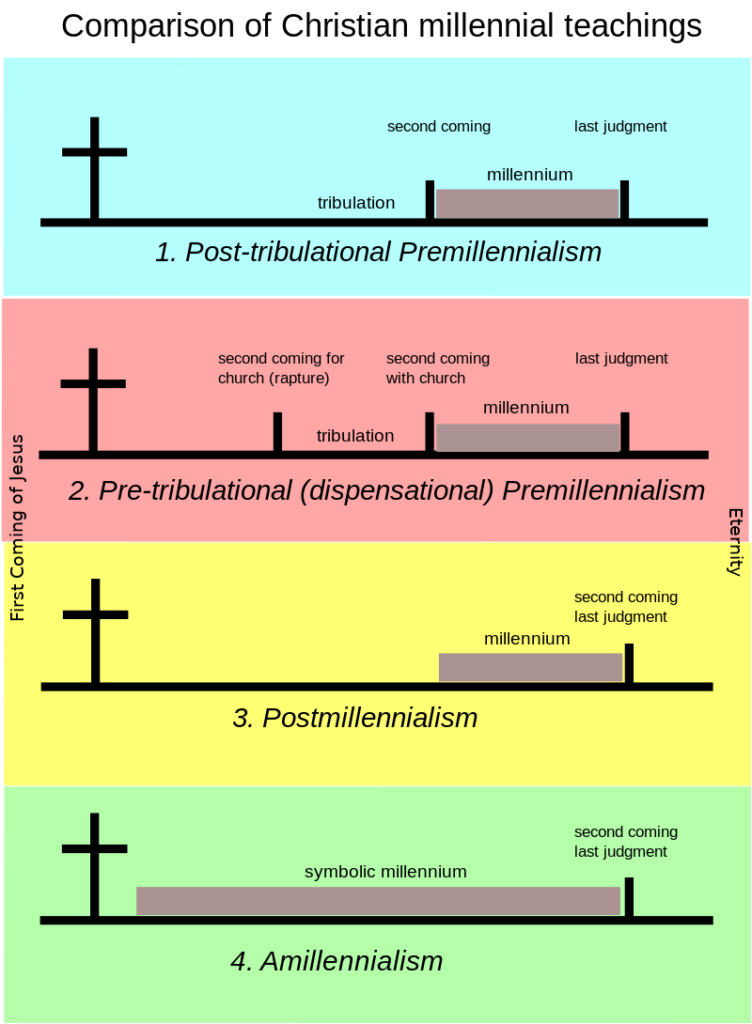Most Recent News


Popular News



Are we living in the End Times? What do those days even look like? A brief look at two historic positions of the church regarding the latter days.

I have been getting some emails and comments on my article ‘The Radical Christian Degeneration Of The 1800s‘ that are pointing out a supposed contradiction regarding my statements that Christians should hold to the historic faith over newfangled conceptions.
It usually goes something like this:
This is wrong. There are valid but competing Christian beliefs regarding the end times. It’s not all amillennialist.
However, there are also some teachings that are not so valid. Some false teachings that did randomly pop up in the 1800s.
Christians often mess these up. So let’s briefly touch on these, since this seems to be a common problem.
Before we begin, always remember the motto: In Essentials Unity, In Non-Essentials Liberty, In All Things Charity. Don’t forsake Christian brothers because they slightly differ on end times eschatology. This is not an essential. I may joke around in this article about some eschatological positions, but I’m not arguing over your status as a Christian brother here. Take it in good faith.
Let’s start with some definitions. This is a really solid intro article:
There are several systems of thinking when it comes to End Times eschatology. The major views are Amillennialism, Postmillennialism, and Premillennialism. There are two kinds of Premillennialism: Dispensational Premillennialism and Historic Premillennialism. Of the two, Historic Premillennialism is the least well-known, but it is also the oldest view and the most comfortable with not knowing all the details of exactly how the End Times will play out.
[…]
Amillennialism says the entire Church Age from Christ’s first coming until His second coming is the millennium. The millennial kingdom is not a literal 1,000 years of Christ reigning on earth; it is being fulfilled spiritually right now as Christ reigns in our hearts. When Christ returns, there will be the final judgment and then the New Heavens and the New Earth.
Postmillennialism says believers in the Church Age yield to the Holy Spirit and over time create a Christianized world which ushers in the ideal conditions described in Revelation 20. When everything is just right, Christ will return, there will be the final judgment, and then the New Heavens and the New Earth.
Premillennialism says Christ will return to earth after the tribulation and reign with believers for a literal 1,000 years after which there will be one final battle where Satan is ultimately defeated and the New Heavens and New Earth appear. In general, Dispensational Premillennialists believe that Jesus Christ will rapture believers before the tribulation and then return to earth to set up His kingdom when the seven year tribulation is over. In general, Historic Premillennialists believe that the rapture and the second coming of Jesus are one and the same event which happens after the tribulation.
The author above calls it “Dispensational Premillennialism“. I call it Zionist Premillennialism. Because that’s what its goals are and why it was created in the 1700-1800s: To benefit Zionism.
So, the vast majority of Christians ascribe to one of the following four end times views:

Both Postmillennialism and Zionist Premillennialism are nontraditional, modern beliefs. They both first appeared post-Enlightenment. They are not historic heritage Christianity.
Postmillennialism started in the 1600-1700s depending on who you talk to, but never gained traction until the 1800s. It has its problems, but is not as bad as Zionist premil.
Zionist premillennialism in particular is a major problem, because it began in the 1800s (remember The Radical Christian Degeneration Of The 1800s article I mentioned?) that specifically perverts the historic, traditional position of historic premillennialism. It takes that historic position and completely corrupts it.
Thus, both the postmil and the Zionist premil positions are new degenerations, mostly of the 1800s. These are completely new beliefs that just popped up some 1800ish years after Christ’s Church was founded. But one is quantifiably worse than the other.
We should not need a “historic” modifier before premillennialism. But sadly, we have one. That’s because of the J. Nelson Darby corruption. This one false preacher brought about the Zionist premillennialism, dispensationalism, and a pretribulational rapture theory. All lies.
These are the types of degenerations and positions I persuade my readers against. The faith was delivered once and for all. It’s done. We should not have new magical beliefs that stem from Enlightenment teachings. Much less should we pick up new beliefs that spring from one person. We should hold to the true faith that was given to our ancestors.
There is a wealth of information out there on why all of those are lies, but that’s not the point of this article. In here we’re talking true Christian tradition.
Let’s contrast those two positions to historic premillennialism and amillennialism, which have been around since the time of the earliest Church Fathers—The original twelve apostles, even. That is traditional, historic Christianity.
You often hear amils claim that only their position is historic. This is a lie. Their position did not become dominant until in the latter 300s. The same time when Roman Catholicism became dominant.
Even later Church Fathers like Augustine of Hippo (354-430 A.D.) struggled to accept amil early in his religious life. What do you think he debated it with? The only non-cult alternative was historic premil. Those were the only two choices. He in particular ended up on amil, but not after long consideration regarding the two common positions of the time.
Which means there were two positions at the time worthy of consideration. It was not just amil.
Therefore, to answer this now common critique I am receiving:
I have nothing against my amil brothers and sisters, except when they boldly lie and try to claim that premil is not a historic position within the church. It was just as common in the Church Father age as amil, if not more so in the earliest years.
For example, Polycarp, one of the three apostolic fathers, was certainly a premillennialist. Irenaeus (his student) was without a doubt one, as well.
Polycarp and Irenaeus learned directly from—Guess who?—the Apostle John. You know, the guy that actually wrote Revelations, from which we derive the majority of our eschatological beliefs.
In fact, as far as I am aware and from what I can find in my research, none of the direct followers of John were amil. All the known apostles of John (Ignatius, Polycarp, and Papias) were premillennialists. As are their students.
While you can argue with me all you want about the student’s understanding differing from the teacher, you cannot debate that premil is not a historic position of the Church. It was literally around when the Scripture itself was just written and the individual who wrote it was still alive. You cannot get more traditional than this.
Even further, big names in the early church were clearly historic premil. This includes Justin Martyr, Tertullian, Papias, Methodius, Commodianus, Theophilus, Hippolytus of Rome, and plenty of others.
Historic premil may have fallen out of favor once the Roman Catholics came to dominant everything and Montanus was rebuked, but that changes nothing regarding the fact that this is a historic position in the early church. It was a valid position then, and it remains a valid position today.
At the root of it all: I do not care if you are amil or historic premil. I respect both positions.
But if you are postmil or zionist premil, you should do some soul searching. Why are you ascribing to beliefs that are infested with the Enlightenment Lie? This is the same lie that killed Christendom.
Regardless of our own individual beliefs, I think amils and historic premils should at least come together and celebrate the fact that we are neither postmils nor zionist premils. Which means we’re not completely lost on end times eschatology, so that’s nice. Praise God for that.
Read Next: Ways To Contribute: The Community Chieftain
If you enjoyed this article, bookmark the website and check back often for new content. New articles most weekdays.
You can also keep up with my writing by joining my monthly newsletter.
Help fight the censorship – Share this article!

(Learn More About The Dominion Newsletter Here)